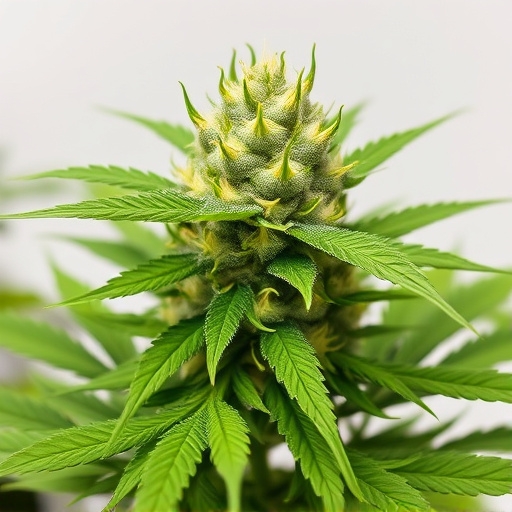Lemon cannabis strains, popular for their citrusy aroma and effects, stimulate appetite through a combination of THC and terpenes like limonene, which enhance each other's effects on neurotransmitters related to eating. While these strains offer medicinal benefits, especially for conditions causing weight loss, users with diabetes or heart disease should exercise caution due to potential health risks associated with overeating induced by cannabis. Balanced diet and listening to hunger cues are essential for safe consumption.
Discover why cannabis flower triggers hunger pangs, a phenomenon that has intrigued many. This article explores the science behind cannabis’ appetite stimulation, shedding light on how it interacts with our bodies’ endocannabinoid system. We delve into the specific effects of lemon cannabis strains, known for their unique terpene profiles, enhancing both flavor and potential therapeutic benefits. Balance your mind and body while understanding the potential advantages and precautions of cannabis-induced hunger.
- The Science Behind Cannabis and Appetite Stimulation
- Exploring Lemon Cannabis Strains and Their Effects
- Potential Benefits and Precautions of Cannabis-Induced Hunger
The Science Behind Cannabis and Appetite Stimulation

The science behind cannabis and appetite stimulation is a fascinating interplay between chemicals in the plant and our bodies’ natural systems. When you consume cannabis, particularly strains known for their high THC (tetrahydrocannabinol) content—like some lemon cannabis strains—it interacts with your endocannabinoid system (ECS). The ECS regulates various physiological processes, including appetite, memory, mood, and pain sensation. THC mimics the effects of a natural endocannabinoid produced by our bodies, binding to specific receptors in the brain and throughout the body.
This binding can lead to increased hunger by altering the levels of neurotransmitters that influence eating behaviors. Additionally, cannabis strains with high terpenes like limonene, commonly found in lemon cannabis strains, have been shown to enhance THC’s effects on appetite. Limonene itself has appetite-stimulating properties and is known for its uplifting and soothing aromas. Together, these compounds create a synergistic effect, making it more likely that consumers will experience heightened hunger after consuming specific lemon cannabis strains.
Exploring Lemon Cannabis Strains and Their Effects

Lemon cannabis strains have gained significant popularity among users seeking both recreational and medicinal experiences, primarily due to their unique aromatic profile and distinct effects. These strains often boast a zesty, citrusy aroma and taste, reminiscent of lemons, which adds to their appeal. The effects of lemon cannabis can vary from uplifting and energizing to calming and relaxing, depending on the specific strain and individual biochemistry.
One of the key compounds responsible for the hunger-inducing effects in lemon strains is THC (tetrahydrocannabinol), known for its role in modulating appetite and pleasure centers in the brain. Higher concentrations of THC can intensify these effects, leading users to crave food—a phenomenon often described as “munchies.” Additionally, lemony strains may also contain terpenes like limonene, known for its citrusy scent and potential mood-boosting properties, which could contribute to the overall sensory experience and appetite stimulation.
Potential Benefits and Precautions of Cannabis-Induced Hunger

Cannabis-induced hunger, often referred to as “the munchies,” can have both potential benefits and precautions. For many users, this effect is a welcome side kick that encourages them to eat healthily, leading to increased energy levels and improved overall well-being. Some studies suggest that certain cannabis strains, like lemon cannabis strains, high in THC and CBD, can stimulate appetite and even aid in weight gain for those experiencing conditions such as cancer or HIV/AIDS, where loss of appetite is a common challenge.
However, it’s crucial to be mindful of the potential drawbacks. For individuals with pre-existing conditions like diabetes or heart disease, cannabis consumption could lead to impaired judgment regarding portion sizes, potentially resulting in overeating and related health issues. Additionally, excessive eating due to cannabis use may cause temporary weight gain. Therefore, while enjoying the effects of lemon cannabis strains, it’s essential to maintain a balanced diet and listen to your body’s natural hunger cues.
Cannabis’ ability to stimulate appetite, as evidenced by its effect on users, particularly those with certain medical conditions, offers a compelling insight into the complex interplay between the plant’s chemicals and the human endocannabinoid system. While the science behind it is fascinating, exploring specific strains like lemon cannabis can provide targeted relief for individuals seeking to manage eating-related challenges. However, as with any substance, understanding potential benefits and precautions, especially regarding increased hunger, is essential for making informed decisions.














